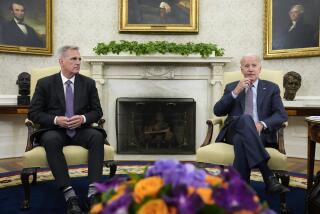No End to the Scrounging
- Share via
The people have spoken. They have, in fact, screamed like midday targets of pickpockets and purse-snatchers. House Speaker Jim Wright (D-Tex.) has heard the screams. As a result, the wages of public service on Capitol Hill will consist, for at least two more years, of one part salary and one part checks written by people who like elected officials to feel obligated to them when the roll is called.
Some of the wages, $89,500 a year, will go on reaching senators and representatives directly from the U.S. Treasury, which gets the money from taxes. The rest will come from the same Americans who pay the taxes, but it will take more circuitous routes. It will come from honorariums for speaking to business people or union officials at lunch or lecturing on campus or making any appearance that can justify some special interest paying a fee and hoping for the best the next time it is particularly interested in which way a vote will go.
That is the meaning of Wright’s decision to let members of the House, who heard the screams long before Wright acknowledged them, vote against a pay raise that they probably deserve to demonstrate that they can and do respond to pressure--an issue that never was in doubt. The raise, which would have amounted to a 51% increase in paychecks, was to be accompanied by new rules forbidding members to take money on the side.
The amount of the proposed raise was chosen by a White House commission, supported by President Reagan and then endorsed by President Bush. Members of the executive branch and the judiciary would have shared in the raises. The commission said that higher pay was essential if government was to compete with industry for top talent, partly because there have been no major jumps in government pay for nearly 20 years. There have been none for the same reason that there will be none this year: Members of Congress, who can speak without notes for hours on virtually any other subject, choke when they have to explain to voters that they need raises.
Having choked for so many years, Congress has made catching up with inflation sound enormously expensive, and it is. Just to reach the buying power of salary levels of 1969, government officials would need 35% raises. It might have worked better if the commission had recommended catching up in stages rather than all at once. But Wright proposed something like that when he suggested that members settle for a 30% increase, and the public seemed not to find that any more palatable.
It may well be, as cynics would have us believe, that members of Congress love what they do and will cling to office no matter how few groceries their checks will buy in yet another 20 years. It also may well be that the nation would survive.
But government loses people at all levels from science to Cabinet officer because they cannot afford to put their children through college on federal pay, and that cannot be considered healthy.
Nor can the nation take comfort from anticipating that Congress will continue to scrounge on the side to make ends meet, as exemplified in the financial arrangements for a retreat in the West Virginia hills made by Democrats over last weekend to discuss salary and other issues.
About two-thirds of the expenses for transportation, room and board were picked up by the National Legislative Educational Foundation, a group made up of lobbyists for corporations and labor unions. Where did they get the money? From the American public, in the form of profits and dues, which probably would come closer to getting its money’s worth from its taxes if congressional salaries were high enough to put an end to the scrounging.
More to Read
Get the L.A. Times Politics newsletter
Deeply reported insights into legislation, politics and policy from Sacramento, Washington and beyond. In your inbox twice per week.
You may occasionally receive promotional content from the Los Angeles Times.









